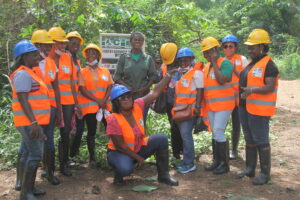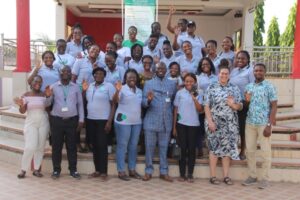The objectives of the action are to:
• Improve women’s legal capacity and gender mainstreaming in forest laws and VPA implementation, and
• Support the negotiation of Social Responsibility Agreements in Ghanaian communities
Specific activities under the projects are:
1. Develop and lead sessions on gender mainstreaming in forest laws and VPA implementation in the ClientEarth ‘Legal Working Group’
2. Organize trainings for approximately 20 women active in the forest sector, focusing mainly on CSOs but also open for women from media, government and the private sector
3. Provide community level support to negotiation of Social Responsibility Agreements (SRA) between forest fringe communities and loggers.
4.Forest Monitoring Training
The forestry sector across the globe is generally male dominated. Although women have very important roles to play in nurturing, managing and monitoring of forest resources, they are mostly sidelined due to lack of understanding of these roles by their male counterparts; perception that forestry is a male-dominated field; and of lack of clarity among researchers and practitioners on how to harness the capabilities of women for the development of the sector.
The situation is not different in Ghana, where the perceived patriarchal nature of the sector literally relegates women to the background and sometimes discourage women especially the young ones from getting into the profession. With the emerging global trend to promote the inclusion of all stakeholders in all relevant issues; studies on gender gap in the forestry sector and the call for bridging this gap; there is the need to strengthen the participation of women in the forestry sector.
Client Earth, under their Forest Governance Markets and Climate Project titled “Using the law to address illegal use of forest resources and promote better forest and land governance” partnered Rights and Advocacy Initiative Network (RAIN), a non-governmental organization in Ghana to build the capacity of Women in the Forestry sector.
‘Women in Forestry’ therefore emerged as a platform initiated by RAIN to organize women from different groupings in the forestry sector including Academia, Media, Government agencies, the Timber Industry and Civil Society Organizations, with an objective to enhance their capacity to contribute meaningfully to decisions concerning the sector. The platform have so far accorded these omen the opportunity to learn about ongoing processes within the forestry sector, share experiences from across the sector and also provide opportunity and a space to encourage and mentor young practitioners in the sector.


The forestry sector across the globe is generally male dominated. Although women have very important roles to play in nurturing, managing and monitoring of forest resources, they are mostly sidelined due to lack of understanding of these roles by their male counterparts; perception that forestry is a male-dominated field; and of lack of clarity among researchers and practitioners on how to harness the capabilities of women for the development of the sector.
The situation is not different in Ghana, where the perceived patriarchal nature of the sector literally relegates women to the background and sometimes discourage women especially the young ones from getting into the profession. With the emerging global trend to promote the inclusion of all stakeholders in all relevant issues; studies on gender gap in the forestry sector and the call for bridging this gap; there is the need to strengthen the participation of women in the forestry sector.
Client Earth, under their Forest Governance Markets and Climate Project titled “Using the law to address illegal use of forest resources and promote better forest and land governance” partnered Rights and Advocacy Initiative Network (RAIN), a non-governmental organization in Ghana to build the capacity of Women in the Forestry sector.
‘Women in Forestry’ therefore emerged as a platform initiated by RAIN to organize women from different groupings in the forestry sector including Academia, Media, Government agencies, the Timber Industry and Civil Society Organizations, with an objective to enhance their capacity to contribute meaningfully to decisions concerning the sector. The platform have so far accorded these omen the opportunity to learn about ongoing processes within the forestry sector, share experiences from across the sector and also provide opportunity and a space to encourage and mentor young practitioners in the sector.

Sign in to your account